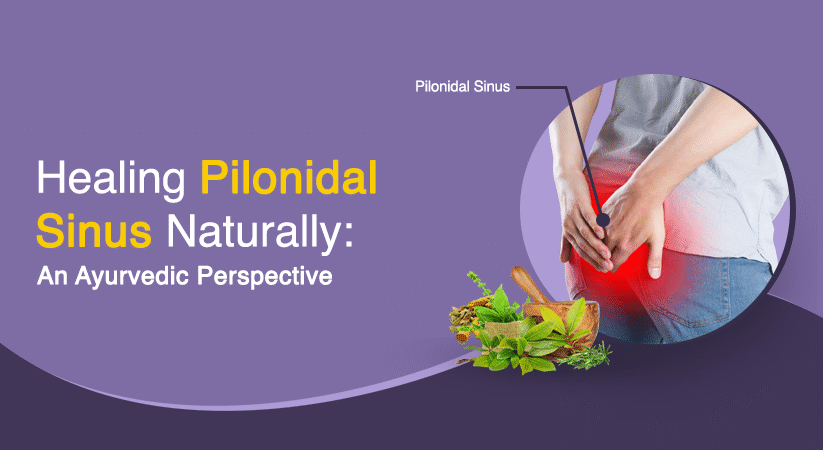Understanding the Concern
Pilonidal sinus is a painful and recurring condition that can affect daily life and cause discomfort, particularly in young adults. While conventional treatment often involves surgery, many people are now exploring natural and non surgical approaches for lasting relief. Ayurveda, India’s ancient system of holistic medicine, offers a unique perspective on managing pilonidal sinus through gentle, effective, and individualised methods.
In this article, we will explore what a pilonidal sinus is, how Ayurveda explains and treats it, and the role of Kshara Sutra therapy, herbal remedies, diet, lifestyle, and Panchakarma in promoting long-term healing.
What is a Pilonidal Sinus?
A pilonidal sinus (PNS) is a small tunnel or tract that develops near the cleft of the buttocks, often containing hair, debris, or fluid. This condition may become infected, leading to swelling, pain, discharge of pus, or the formation of an abscess.
Common symptoms include:
- Pain and swelling in the sacrococcygeal (tailbone) region
- Discharge of pus or blood from the sinus opening
- Recurrence of infection despite temporary relief
- Difficulty sitting or walking comfortably
Causes and risk factors:
- Ingrown hair or hair penetration into the skin
- Friction and prolonged sitting
- Hormonal factors in young adults
- Poor hygiene or excessive sweating
Method: Ayurvedic Approach to Pilonidal Sinus
Ayurveda views pilonidal sinus as a condition caused by an imbalance of doshas (Vata, Pitta, and Kapha) and poor tissue metabolism (dhatu dushti). Instead of only focusing on removing the tract surgically, Ayurveda emphasises cleansing, healing, and preventing recurrence through natural therapies.
In Ayurveda, a pilonidal sinus is compared to Nadi Vrana (sinus-type wound), where channels form due to tissue damage and improper healing. Treatment focuses on cleansing the tract, reducing infection, and promoting natural closure.
1. Kshara Sutra Therapy — A Minimally Invasive Ayurvedic Solution
One of the most successful Ayurvedic procedures for pilonidal sinus is Kshara Sutra therapy, a minimally invasive method recognised even by modern medical authorities in India.
- How it works:
A medicated thread coated with herbal alkaline preparations (kshara) is inserted into the sinus tract. This thread gradually cuts, cleanses, and heals the tract while preventing infection.
- Benefits of Kshara Sutra:
- Avoids major surgery
- Minimal bleeding and pain
- Short recovery time
- Reduces recurrence rates
- Cost-effective and safe
At reputed centers like Chirag Global Hospitals, experienced Ayurvedic surgeons perform Kshara Sutra therapy under hygienic conditions, ensuring both safety and effectiveness.
2. Ayurvedic medicines
Ayurveda recommends natural herbs to cleanse the body and promote wound healing.
Common herbs used in pilonidal sinus management:
- Turmeric (Haridra): Anti-inflammatory and antibacterial properties
- Neem (Nimba): Purifies blood and prevents infection
- Triphala: Aids digestion and detoxification
- Yashti Madhu (Licorice): Soothes inflammation and supports tissue healing.
- Guduchi (Amruthaballi): Strengthens immunity and promotes detoxification.
These herbs may be consumed internally or applied externally as medicated pastes, depending on the physician’s advice.
3. Diet and Lifestyle Support
Since diet directly affects healing, Ayurveda emphasises pathya (wholesome foods) and apathya (foods to avoid).
- Recommended diet:
- Fresh fruits and vegetables
- Whole grains and light, easily digestible meals
- Warm water
- Fiber rich foods to prevent constipation
- Foods to avoid:
- Oily, fried, and processed items
- Excessive dairy, sweets, or red meat
- Alcohol and smoking
Lifestyle tips:
- Maintain good hygiene of the buttock area
- Avoid prolonged sitting; take breaks to walk
- Regular mild exercise and yoga to improve circulation
- Wear loose, breathable clothing to reduce sweating
FAQs on Pilonidal Sinus in Ayurveda
1. Can Ayurveda cure a pilonidal sinus?
Yes. Through Kshara Sutra therapy, Ayurvedic medicines and lifestyle changes, Ayurveda provides a sustainable, minimally invasive cure for pilonidal sinus.
2. How to close a pilonidal sinus naturally?
Natural closure involves keeping the area clean, using herbal remedies, following a healing diet, and undergoing Kshara Sutra therapy for complete closure.
3. What is the root cause of pilonidal sinus?
The primary cause is hair penetration into the skin combined with poor hygiene, prolonged sitting, and dosha imbalance, which leads to tract formation and infection.
Summary:
Pilonidal sinus is a recurring condition that can significantly impact the quality of life. While surgery is the standard approach in conventional medicine, Ayurveda offers safe and effective non-surgical alternatives, such as Kshara Sutra therapy, which is supported by herbal remedies, a balanced diet, lifestyle modifications, and detoxification therapies.
With a focus on holistic healing, prevention, and individualised care, Ayurveda offers long-lasting solutions with minimal side effects. If you are seeking a natural, minimally invasive option for a pilonidal sinus, consulting a trusted Ayurvedic hospital like Chiraayu Ayurveda Hospital, a unit of Chirag Global Hospitals can help you find the right treatment pathway.
Continue reading here: Ayurvedic Treatment for Pilonidal Sinus





Comments